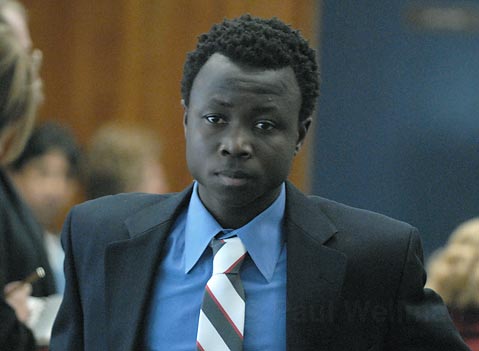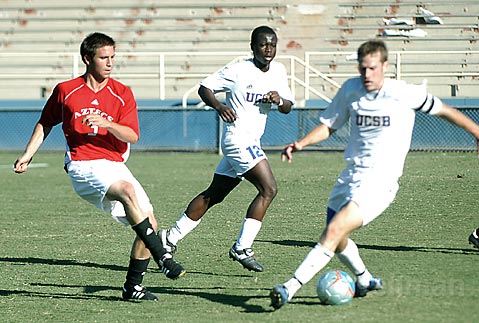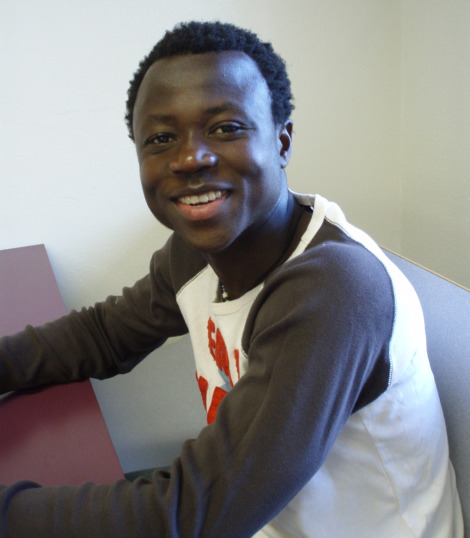Exonerating Eric Frimpong
Was the Former UCSB Soccer Player Unfairly Convicted of Rape? One Insider Says Yes

After spending much of the last two years researching the 2007 trial of Eric Frimpong for rape, journalist and author Joel Engel believes that the former UCSB soccer player was wrongly convicted. This article is the result of the 6,000 hours of unpaid research he and his uncle did for Frimpong’s appellate team, and represents solely his opinions on the matter. Frimpong’s case is currently under appeal, and a decision is expected soon.
I used to think that even bad cops lied only about the worst bad guys. I believed most prosecutors tried only defendants they considered guilty beyond reasonable doubt. And I assumed that highly paid defense attorneys, aware that someone’s freedom was at stake, carefully prepared their cases before walking into court.
Then I met Eric Frimpong.

Santa Barbarans may remember Frimpong, the native of Ghana who was instrumental in the UCSB soccer team’s 2006 national championship. Soon after hoisting the trophy – and being drafted by the Kansas City Wizards of Major League Soccer – he was arrested for and subsequently convicted of raping a 19-year-old university freshman with a blood alcohol level determined to be between 0.26 and 0.33, not far from anesthesia level. I will continue the established journalistic nicety of referring to her as Jane Doe, though after 20 months investigating this case, I have become convinced that she helped send an innocent man to prison.
Eric is now beginning year three of his six-year sentence, confined at the California Correctional Institute in mountainous Tehachapi, a 1,650-acre facility west of Mojave from which there has been only one successful escape, decades ago. As a level-two prisoner, Eric has a fair amount of free movement, especially to play soccer on a dedicated field and socialize in the large green yard surrounded by buildings that, from the outside, aren’t dissimilar from a 1950s style suburban elementary school. But everywhere he looks, the razor wire, cameras, guards, electronic gates, manned towers, thick bars, and steel-reinforced doors in industrial beige walls with peeling paint remind him he’s living a nightmare against which his chosen defense as a believing Christian is a touching faith in what he calls “God’s plan.” Let’s hope he, or He, knows something.
Each of the dozen times I’ve visited him to further the investigative work in support of his appeal, he has seemed less ingenuous and more reserved. One Friday last year, when a guard showed up to end our meeting in what the prison sardonically refers to as “The Board Room,” I hugged Eric good-bye. It was an impulsive and stupid thing to do. The next morning he called (collect) to say that the guard had stripped him and performed a full body-cavity search, believing that I had secreted some contraband at the last moment – as if the prisoner and I had not been alone in a room, unguarded for the previous two hours.
Eric describes frequent scenes of violence and rage, but he doesn’t share the darkest details. This last August, after posing another two hours worth of questions, I asked how he thought prison had changed him. “It’s made me,” he said, pausing for a moment, “more mature.”
* * *
Eric was arrested February 17, 2007. He was said to have met the young woman at a party on Del Playa Drive in Isla Vista, and taken her first to his cliff-side house down the block for a game of beer pong, and then – in her version of events – to the beach below his house, where the rape was alleged to take place.
I first heard about the case a few days later. My daughter had gone to high school and was now attending college in Boston with a young woman whose boyfriend was Eric’s roommate and former teammate, Patrick Monahan. Coincidentally, Pat was in Boston that weekend, visiting his girlfriend. He got a call from his parents, the people Eric had notified after his arrest.
Loni and Paul Monahan, religiously Christian and politically conservative, live in northern San Diego County. Late in the summer of 2005, they helped Pat, then a freshman, move into UCSB’s Tropicana dorm where the other soccer team members were quartered. When there was some confusion with one of the foreign-born players, a junior who’d just reported and hadn’t yet been assigned a room, someone asked Pat whether he minded having this kid Eric Frimpong crash on his floor for a while.
“Who is he?” Loni asked.
In walked this surprisingly diminutive, charcoal-skinned young man with kind eyes and a perfect smile, all of his worldly possessions contained in a small backpack.
“He started talking,” Loni says, “and we pretty much had no idea what he was saying. He thought he was speaking English, but I think it was still Twi [his native language]. It didn’t matter. We fell in love with him.”
Loni and Paul soon became Eric’s de facto American parents, lacking only legal status. “He was like our third son,” Paul says.
On weekends, Eric often accompanied Pat on the four-hour drive south to the Monahans’ home. He was fascinated with Loni’s washing machine, and asked her to show him how it worked. “The kind of poverty he described boggled my mind,” she says. “I’ll never forget how he’d sleep in his clothes, on top of the covers, with the light on because he was afraid of the dark, and there was a Bible by his side.”
Paul Monahan says it’s no wonder that, when offered a chance for a degree at an American university and to play soccer on a bigger stage, he accepted the scholarship that came with a student visa, plane ticket, and instructions on what bus to board when he arrived at LAX.

Everyone agrees that Eric impressed his coaches and made friends easily. A math and statistics major, he did well in school and his English improved, so in some ways his biggest adjustment was to Isla Vista’s Bacchanalian culture that turns Del Playa Drive into an orgiastic block party Thursday, Friday, and Saturday nights. An Isla Vista Parks and Recreation Department supervisor told me that it’s not unusual for drunken kids to be found lying in bushes and on park paths in the morning. Cleanup for his rec crews often includes used condoms and forgotten panties.
Before Eric began his second year at UCSB, a senior on target to graduate in June, he and Pat and several roommates had moved into a two-story cliff-side house on Del Playa just east of the El Embarcadero beach access. Its back patio, overlooking the Pacific, was dominated by an oversized, hand-painted beer pong table.
Eric’s three-week trial began in late November 2007. Deputy District Attorney Mary Barron called 32 witnesses. Defense attorney Robert Sanger called just one – though not Eric, who, until he heard Sanger say the defense rests, believed he would be telling his story on the witness stand. Judge Brian Hill presented the case to the jury on December 14, Eric’s twenty-second birthday. Deliberations began Monday the 17th. By late that afternoon, Eric had been convicted of raping Jane Doe exactly 10 months before.
* * *
Through the 10 months, I’d kept a semi-interested ear on the proceedings and at one point asked my daughter whether Eric might be guilty. No way, she said, quoting everyone who knew Eric, including UCSB soccer coach Tim Vom Steeg. He’d evidently claimed that if he listed all the players on his team in order of their capacity for rape, Eric would’ve placed 30th out of 30.
So when Eric was convicted, my first thought was to blame racism. This seemed like a good story: Santa Barbara, Mississippi, zip code 1955. I wanted to write it. But the only way to reach Eric, I’d been told, was through Loni Monahan.
When I called her, she was frantic – and, as she later confided, probably on the verge of a breakdown. Judge Hill had just denied attorney Sanger’s motion for new trial and sentenced Eric to six years. It was the Monahans who’d spent $60,000 on Sanger – best known for being on Michael Jackson’s molestation defense team – and they were out of pocket, directly and indirectly, at least a couple of hundred thousand dollars. They had been consumed physically, emotionally, and financially by Eric’s tribulations and trial, and were now struggling personally – with each other – as well. Her first question to me was whether I could donate money to the Eric Frimpong Freedom Fund, which she’d set up to help find and pay for an appellate attorney. I said no, but maybe what I wrote – if I wrote it – would inspire donations.
Loni believed that racism might have played a role but wasn’t the major reason for Eric’s conviction, and that piqued my interest. We met at the Santa Monica home of my uncle, Oscar Rothenberg, a 78-year-old uncommonly astute retired lawyer who’d volunteered some years back to investigate a death-row case for the state public defender’s office. Oscar, it should be noted, is a proponent of capital punishment. What he’s against is someone undeserving being executed. I suspected that he would bring a more jaundiced attitude to hearing Eric’s story than I would – that is, not be swayed by emotion. If, after listening, he decided that Eric was probably guilty, I’d have walked away from what I thought at the time was going to be merely a story.
Both Loni and Paul showed up. They’d carted boxes of documents, including transcripts of trial testimony, up from San Diego. We asked questions, and they answered. We took copious notes. The scheduled two hours became four became seven. It was a mini trial. My aunt, Beth, made us lunch and then a snack. By hour three, I began to believe that Eric might be innocent. By hour five, I could see the same on Oscar’s face. At hour seven, he called Ron Turner, an appellate attorney with whom he’d worked at the state PD’s office. Turner was now a sole practitioner in Sacramento, but he still sometimes took cases assigned by the state. Oscar spent half an hour convincing him to ask the state to assign him Eric, who as an indigent is entitled to a state-appointed attorney.
Turner made clear that he was working on two major death-penalty cases and had no time to do any of the investigation himself. Still on the phone, Oscar looked over at me and said, “What if you had two investigators feeding you information?”
Was he kidding? Oscar was often wracked with pain from a severe cervical spine problem. Now, not only had he volunteered himself to roll a boulder uphill, he’d included me, too. How could I say no? My life, I realized with a shudder, was about to change – how much, I couldn’t possibly have imagined. As with the Monahans, my involvement with Eric would hurt financially: Oscar and I were to be strictly unpaid volunteers. What consoled and excited me, besides trying to undo an apparent wrong, was the thought of working with him. Though he’d married Beth when I was 12, he was the closest relative I’d had to a father, and for decades we usually hadn’t gotten along. So this was an opportunity to establish the kind of relationship with him that I’d always wanted. Of course, the whole thing could’ve blown up – and often did.
On the condition that he’d have two investigators, Turner, with the Monahans’ and Eric’s approval, agreed to take the case. Ron would work on the so-called technical issues for the appeal; for instance, whether there’d been a Miranda violation. Oscar and I would be working only on the habeas corpus brief – trying to prove, in essence, that Eric was innocent.
Because we lacked the power of subpoena, we were armed only with common sense, critical-thinking faculties, and a storyteller’s sense of what’s plausible and what’s not. Reading the trial transcripts over and over, Oscar and I spoke frequently, argued often, and then sent our aggregated findings to Turner. For a long time we maintained our skepticism, agreeing only that, even if Eric were guilty, he had not received a fair trial.
Once we began doing field work, it seemed clear that Eric could not logically have been the perpetrator of any violence that might’ve been committed against Doe, and we quickly formed an alternative and far more reasonable theory of what had happened. That led to contact with experts in geology, odontology, audio technology, and real estate, as well as frat boys, sociologists, scientists, researchers, and possible witnesses – including a young man who saw Eric that night at a time the prosecution contended he was raping Jane Doe.
We took possession of the files from defense attorney Sanger’s office and were disappointed. Though they included the prosecution’s work product turned over under the rules of discovery, much of what we assumed would be there was not. No phone records and text messages of Jane Doe’s boyfriend. No contact info and personal statement of Doe’s roommate. No statements of those who had partied with her that night. No requests for background on the cops themselves. Et cetera. Neither prosecutor Barron nor Sanger had subpoenaed certain information that, it seemed to us, would have been useful, if not necessary, to ensure a just trial.
What makes Eric Frimpong’s wrongful conviction so important and compelling is the ease with which the Sheriff’s Department, District Attorney, and defense acted both wittingly and unwittingly to deprive an innocent of his liberty. If the appeal fails, when Eric is released from prison after serving his time he will be deported back to Ghana and spend the rest of his life as a convicted sex offender, unable to visit the vast majority of countries for either work or pleasure. In other words, a lifetime sentence will have been imposed for a crime he didn’t commit.
Chapter Two: Seeing Sand or Not?
Chapter Three: Jane Doe’s Long Night
Chapter Four: Watching the Detectives
Chapter Five: Part-Time Lover Reconsidered
Chapter Six: Teeth Tell the Truth
Chapter Seven: Jane Doe Tries to Remember



